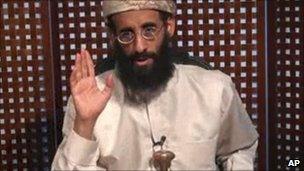Yemen al-Qaeda head Anwar al-Awlaki 'targeted by drone'
- Published

A US drone attack in Yemen targeted but failed to kill one of al-Qaeda's most influential figures, US reports say.
The US-born radical Yemeni cleric Anwar al-Awlaki is head of al-Qaeda in the Arabian Peninsula.
Two brothers believed to be mid-ranking al-Qaeda officials died in a drone strike in south Yemen on Thursday, Yemeni officials said.
The attack came just days after al-Qaeda chief Osama Bin Laden was killed in Pakistan by US Navy Seals.
The Pentagon refused to comment on the reports that Anwar al-Awlaki was specifically targeted in Yemen.
According to Yemen's defence ministry, the missile fired by the drone hit a car in in the province of Shabwa carrying two brothers, identified by Yemeni officials as Musa'id and Abdullah Mubarak.
But reports from Washington now suggest US commanders had believed they had one of al-Qaeda's most valuable targets in their sights.
"We were hoping it was him," one unnamed US official told CBS News.
The reported attempt to kill Mr Awlaki is believed to be the first known US military strike within Yemen since May 2010, when missiles mistakenly killed one of Mr Saleh's envoys.
In September the country's foreign minister said that such unmanned strikes had been suspended.
The report comes as Yemenis continue to take to the streets to demand that Ali Abdullah Saleh, president for 30 years, step down.
Links to attackers
According to the Wall Street Journal, there were several attempts to target Mr Awlaki on Thursday.
He escaped an initial attack of three rockets fired at a vehicle in which he was travelling and then swapped cars with the two brothers, who were killed in a second strike by a single drone, the newspaper said.
Washington considers the Yemen-based al-Qaeda branch the world's most active terror cell.
It is estimated to have some 300 fighters within Yemeni strongholds, clustered around mountain ranges where the central government has little reach.
The group is said to have inspired attacks by Muslims within the US as well as plots to smuggle explosives on planes heading to the US.
Some analysts are convinced that, after the death of Bin Laden, Mr Awlaki represents the greatest threat.
An American-born cleric of Yemeni descent, he was placed on a terrorism blacklist in July 2010 and had imposed financial sanctions on him.
US officials say Mr Awlaki helped recruit Umar Farouk Abdulmutallab, the Nigerian accused of attempting to blow up an airliner as it flew into Detroit on 25 December 2009.
Maj Nidal Hasan, the US Army psychiatrist accused of killing 13 comrades in the Fort Hood shooting in 2009, sought religious advice from Mr Awlaki and saw him preach in the US state of Virginia in 2001, US officials say.
A student found guilty of attempting to murder British MP Stephen Timms in London was also said to have been inspired by Mr Awlaki's online sermons.
- Published2 May 2011
- Published2 May 2011
- Published2 May 2011
- Published3 February 2011
- Published28 March 2011
- Published7 June 2011
- Published7 June 2011